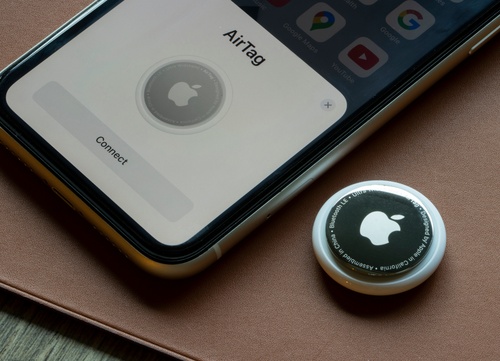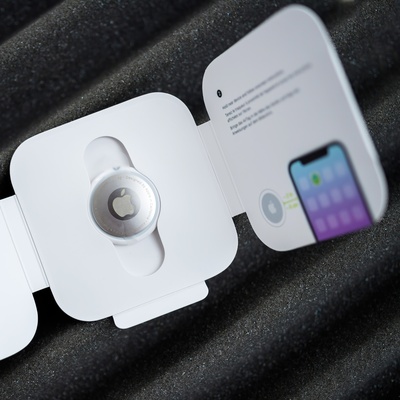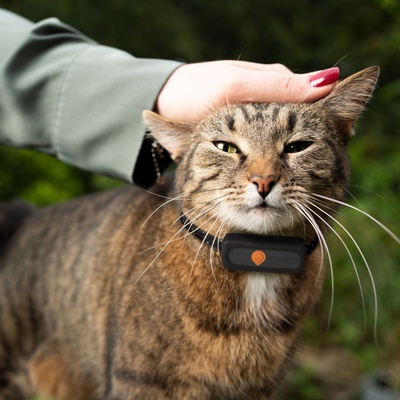Could an AirTag meet your needs?
Discover the complete guide to help you choose the best type of GPS tracker for your needs.

Discover the complete guide to help you choose the best type of GPS tracker for your needs.
In a security-conscious world, Apple's Bluetooth tracker, the AirTag, offers many possibilities. But is it suited to all your needs? This article explores its functionality, features, and compares it to specialized GPS devices to help you make the right choice.
Apple's AirTag, launched in 2021, is a Bluetooth GPS designed to help you find lost items using the "Find My" app on iOS devices. Compact in size, with dimensions of 32 mm in diameter and 8 mm in thickness, and weighing 11 grams, the AirTag can easily attach to a keychain or slip into a wallet.
It features a replaceable CR2032 battery that promises up to one year of battery life, and a speaker that emits sound to help locate nearby items. Equipped with Apple's U1 chip for Ultra Wideband (UWB) technology, it offers more precise location tracking with compatible devices.
The AirTag stands out for its simplicity and elegant design. It can be personalized with free engravings when purchased through Apple's website, and there is a wide market of third-party accessories offering keychains, cases, and mounts in various colors and materials.
The AirTag is also attractively priced at around
for a single unit or
for a four-pack.
Click on the title of the chapter you are interested in.
Let's take a look at Apple's AirTag: its GPS tracking capabilities, the 'Find My' network, and its compatibility with iOS and Android devices.
The AirTag primarily functions via Bluetooth Low Energy (BLE) technology to communicate with compatible devices within a standard range of about 30 feet.
Its efficiency is optimal when within direct connection range of an iOS device, such as an iPhone or iPad, which relays its position to the user via the "Find My" app.
Apple's "Find My" network plays a crucial role in the AirTag's functionality, extending its range beyond standard Bluetooth limits through crowd GPS technology. If an AirTag is out of direct range, it can still be located through the "Find My" network.
Nearby Apple devices detect the AirTag's Bluetooth signal and transmit its location to iCloud, allowing the owner to view the AirTag's location on a map.
While designed primarily for optimal use with Apple devices, AirTag also offers limited compatibility with Android devices. Android users can detect a nearby AirTag using NFC technology.
However, full functionality, such as precise location tracking and crowd GPS, is not available on Android devices, reflecting the AirTag's integration within the Apple ecosystem.
18 questions you need to ask yourself before buying a GPS tracker for your loved ones!
Thanks to its versatility, the Apple AirTag lends itself to a wide range of uses in everyday life. From protecting your belongings to monitoring your vehicles, this technological tool can play a crucial role in managing what's important to you.
The most obvious and perhaps most common use of the AirTag is for securing personal belongings.
Its location technology can be a valuable ally in protecting your items from loss or theft, offering an extra layer of security for items such as bags, laptops, and even bicycles.
The AirTag is also an innovative solution for tracking the location of your car, motorcycle, or bicycle. In the event of theft, the AirTag can provide valuable information to assist in the recovery of the vehicle.
However, it is not a comprehensive anti-theft system but rather a complement to existing security measures.
The AirTag can be used to track your pets, but it is important to note that there are more specialized solutions like Weenect, designed specifically for pet tracking. These devices offer features tailored to their use, such as water resistance, real-time location tracking, and greater accuracy.
While the AirTag may be considered a temporary or supplementary solution, it is important to note that Apple does not recommend using the AirTag for pets due to the risk of ingestion. For reliable and pet-specific tracking, it is advisable to use dedicated products.
To help you, we invite you to download this free guide. It will answer all your questions:
And much more...
Apple's AirTag, with its innovative features, offers many advantages but also has certain limitations. Here's a look at the strengths and limitations of this device to help you decide whether it's right for you.
One of the practical aspects of this subscription-free GPS tracker is its ease of use. The interface is designed to be intuitive, making the device accessible to a wide range of users, regardless of their technical familiarity.
The simple installation process does not require any technical skills. The "Find My" app for managing the device is also user-friendly, allowing users to locate lost items with just a few clicks.
The acquisition cost of the AirTag is one of its major assets. With an affordable unit price of
and economical multi-pack offers, the AirTag is an effective and financially accessible tracking solution.
This advantageous pricing makes the AirTag particularly attractive to users who want to secure multiple items without investing in more expensive solutions.
While the AirTag offers many benefits, it also raises privacy and security concerns. There have been questions about the potential for non-consensual tracking, prompting Apple to integrate measures to prevent such misuse.
However, the balance between functionality and privacy remains a subject of debate.
The AirTag also has its technical limitations. Its effective range is limited to Bluetooth connection, typically around 30 feet inside, but this distance can be significantly extended through the "Find My" network's crowd GPS feature. However, its range depends on the proximity of other Apple devices.
In less densely populated areas or with fewer Apple users, the accuracy and efficiency of location tracking can be reduced. Additionally, the AirTag is not designed for real-time tracking or long-distance monitoring, which can be a constraint for specific uses.
Apple's AirTag and specialized GPS trackers for pets, such as Weenect, offer distinct features tailored to different needs. The AirTag uses Bluetooth technology for location tracking, while devices like Weenect include additional features such as GPS location, activity monitoring, geofenced safety zones, and even health tracking options.
Specialized trackers generally offer superior accuracy and range, as well as real-time and unlimited distance tracking, essential for the safety of pets that can travel long distances.
To choose the appropriate tracking device for your pets, it is crucial to consider their specific needs. For a pet that mainly stays at home or in a confined environment, an AirTag might suffice.
However, for pets that tend to roam far, a specialized GPS tracker is recommended for more precise and reliable location tracking.
Choosing between an AirTag and a specialized GPS device largely depends on your individual needs. For securing personal belongings and simple everyday use, the AirTag is an excellent choice.
However, for more specific and detailed tracking needs, such as monitoring pets, a loved one, or advanced surveillance, it is better to opt for specialized devices. Take the time to consider your specific needs and tracking expectations to make an informed decision.
18 questions you need to ask yourself before buying a GPS tracker
To access the most relevant information, suitable payment methods, and delivery in your region, please select the website corresponding to your country.















